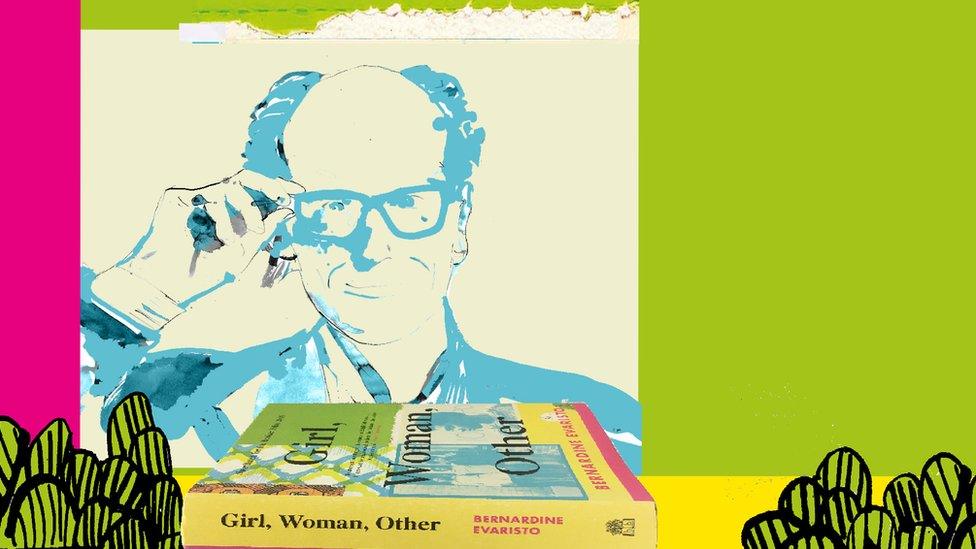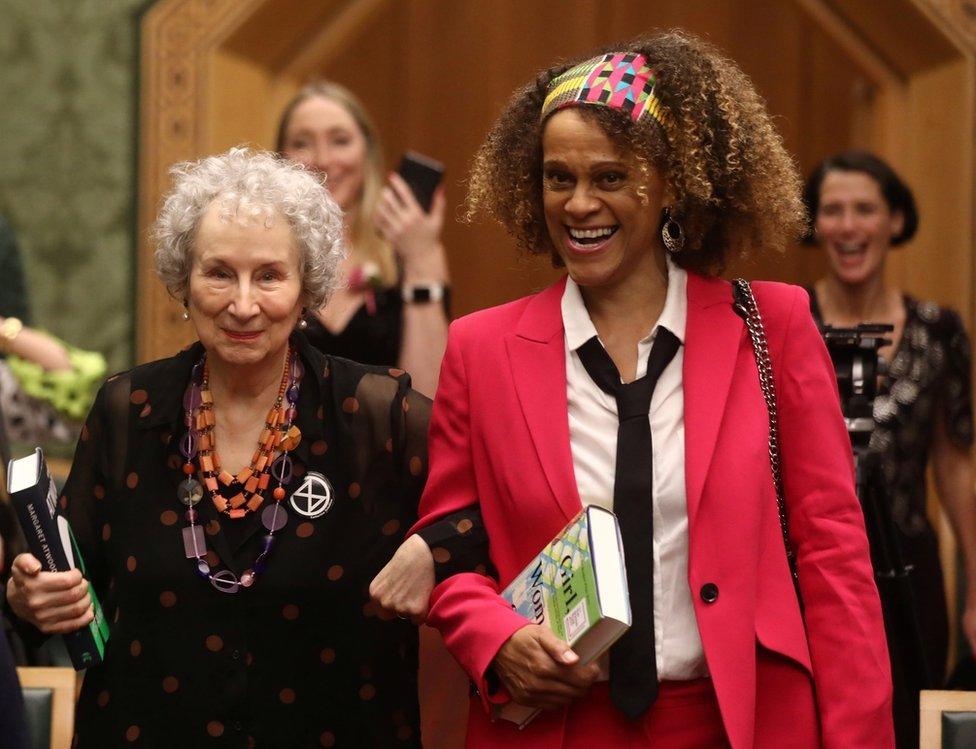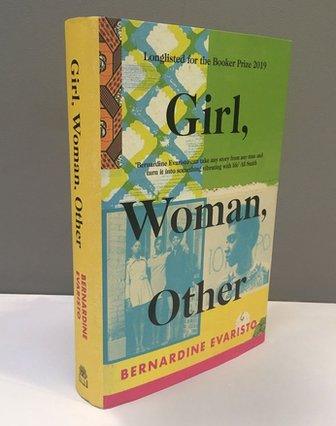Booker Prize: Will Gompertz reviews Girl, Woman, Other by Bernardine Evaristo ★★★★☆
- Published

Indecision is not a trait you'll find in any of the 12 female characters in Bernardine Evaristo's novel Girl, Woman, Other. They're a feisty bunch. Unlike this year's Booker Prize judges who bottled it when it came to their one and only job, which was to pick a single winner.
We all know arts prizes are a nonsense.
There's no such thing as a "best" anybody when it comes to creative excellence: judgement is subjective and discriminatory. But if you do choose to play the game, then at least have the fortitude to see it through. Don't do what this lot did and give us a shortlist of a shortlist.
That's just wet.
And annoying.
I was going to review this year's winner, then I had to pick one of the two finalists. I've gone for Evaristo over Atwood because we know lots about the Canadian and less about the Anglo-Nigerian. You might not agree with my rationale, but at least it's a decision!

Margaret Atwood (The Testaments) and Bernardine Evaristo (Girl, Woman, Other) celebrate their joint Booker Prize success, after the judges "explicitly flouted the rules" and gave the award to both of them
The first thing I will say about Evaristo's 452-page novel is it has - to use a notorious term employed by a previous Booker judge - "readability".
The structure is simple: there are a dozen separate character portraits divided equally into four chapters. Each cluster gives us the lowdown on three (usually) black British woman whose lives are interconnected.
So, chapter one starts with Amma, a middle-aged, politically engaged lesbian theatre-maker whose latest play is about to be staged at the National Theatre. Next is her daughter Yazz, a precocious undergraduate who hangs with a group of similarly assertive female pals who agree that:
"…the older generation has RUINED EVERYTHING and her generation is doomed
unless they wrest intellectual control from their elders
sooner rather than later"
And then there's Dominique, Amma's great friend and long-time collaborator, who falls for a controlling radical feminist and moves to America.
The following three chapters continue the same pattern with occasional stories overlapping to a greater or lesser extent with those earlier in the book. The portraits are well-drawn if a little sketchy. Some characters you want to get to know better, others leave just in time.
The novel's geometric shape gives it a solid form on which to explore its major themes of identity, race, friendship, loss, love, longing and contemporary Britain. As Roland, Yazz's gay dad, might say in his archly pseudy way, the book is like a cubist painting, examining the same quotidian subjects from a variety of perspectives.
Well, quotidian if you happen to be a black woman living in Britain having to contend with a daily dose of casual racism and prejudice, which is the common dominator that unites the personal vignettes:
"Amma was shorter, with African hips and thighs
perfect slave girl material one director told her when she walked into an audition for a play about Emancipation
whereupon she walked right back out again"
or this, from Bummi's story on migrating to Britain from Nigeria:
"Bummi complained that people viewed her through what she did (a cleaner) and not what she was (an educated woman)
they did not know that curled up inside her was a parchment certificate proclaiming her a graduate of the Department of Mathematics, University of Ibadan
just as she did not know that when she strode on to the graduation podium in front of hundreds of people to receive her ribboned scroll, and shake hands with the Chancellor of the University, that her first- class degree from a Third World country would mean nothing in her new country
especially with her name and nationality attached to it"
Bernadine Evaristo is a good writer.
She's funny, precise and confident.
Her characters have plenty to say, most of it worth listening to, some of it enlightening.
Full stops are abandoned in preference for a poetic style of punctuation with line breaks used to control rhythm and beat. If that sounds horribly mannered, blame my shortcomings, not hers, because the technique works a treat with prose flowing and sparkling like the prosecco at Amma's after-party (final chapter).

The collage of well-composed individual stories the author has constructed into a single, albeit fragmented novel, succeeds in depicting a rich and textured account of life in Britain as seen and experienced by her cast of characters.
It is very nearly a great book, but not quite.
The cracks appear about two-thirds through the novel, when it becomes apparent that the sum is never going to be greater than the parts.
This was the point at which the narrative needed to develop and deepen - to flesh out what has gone before, to draw the reader into the world the characters inhabit.
But instead of building the story and developing the protagonists and their relationships, we are given yet another batch of brief biographies, all of which are fine in isolation - some excellent, actually - but they are too much in the context of the whole: three more passengers squeezing on to an already packed railway carriage.
The once effervescent Girl, Woman, Other becomes a bit monotonous, a tad formulaic; a little predictable.
The lively introductory profiles - the getting-to-know-yous - fail to evolve into complex character studies, the net effect of which is a growing sense of superficiality.
Evaristo does attempt to add drama and three-dimensionality by way of chapter-connecting plot devices, but the set-ups are too obvious and the pay-offs routine.
It leaves you frustrated - too many delicious starters without a truly satisfying main course. In fact, it is doubly frustrating, because this is a book with so much going for it: compelling characters discussing important subjects with intelligence and verve. It is disappointing to be denied the chance to get to know some of them better.
Still, it is still well worth reading.
It is a strikingly contemporary novel that has plenty to say (it very occasionally spills over into lecturing), and does so with some of the finest writing I've read in a long time.
Girl, Woman, Other is Bernardine Evaristo's eighth novel. I have not read her previous seven.
I will make a start now.
Recent reviews by Will Gompertz
Follow Will Gompertz on Twitter, external
